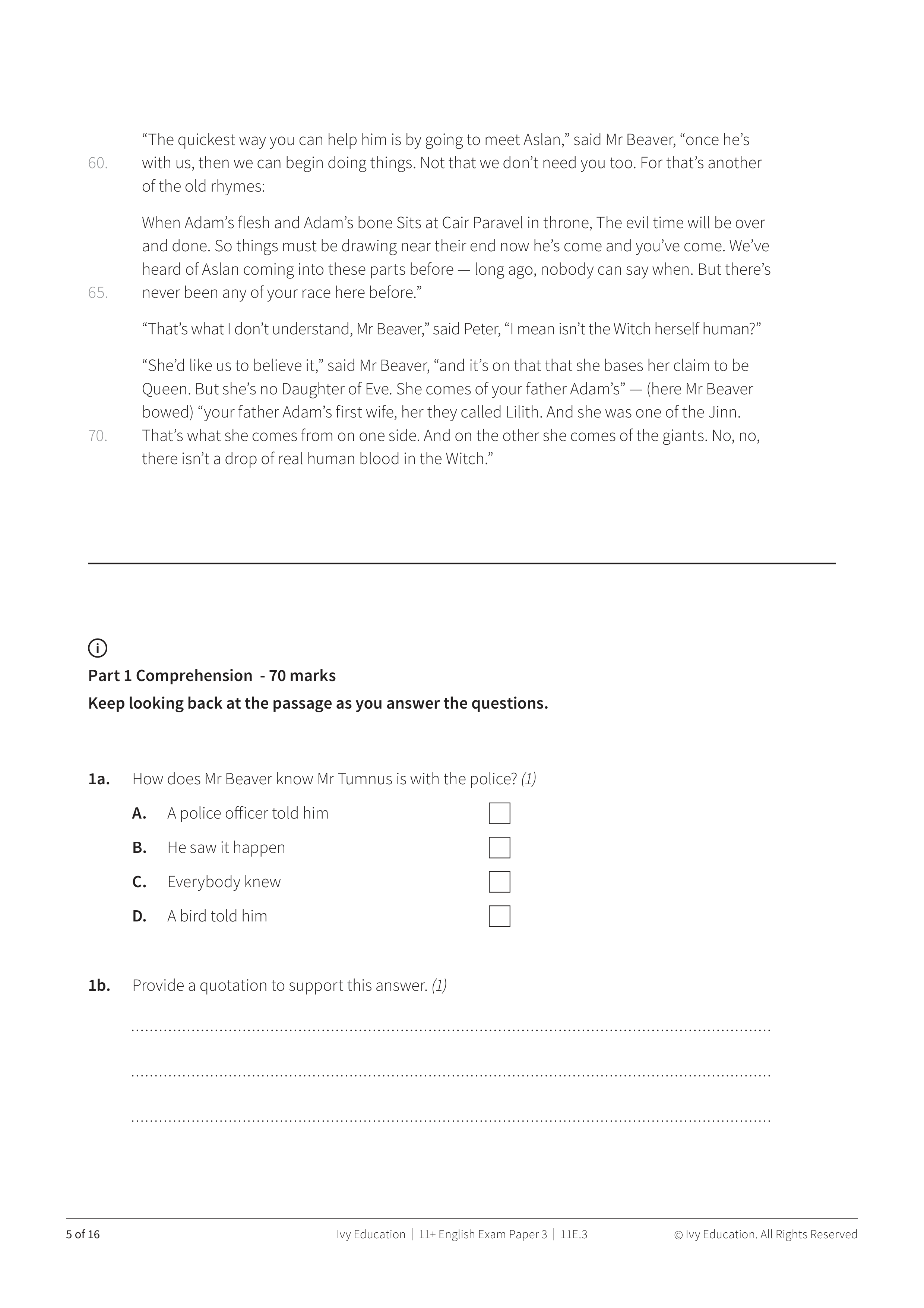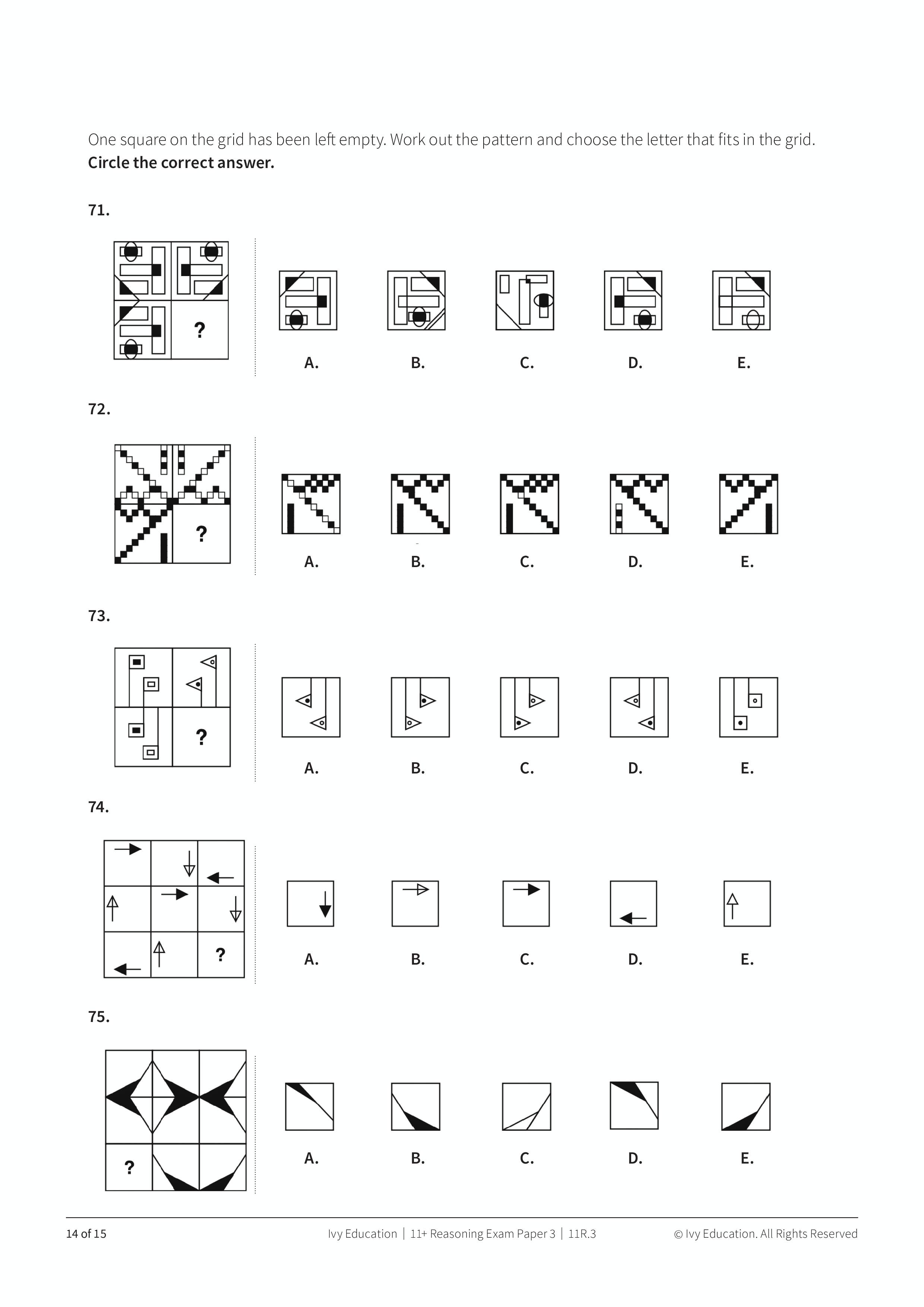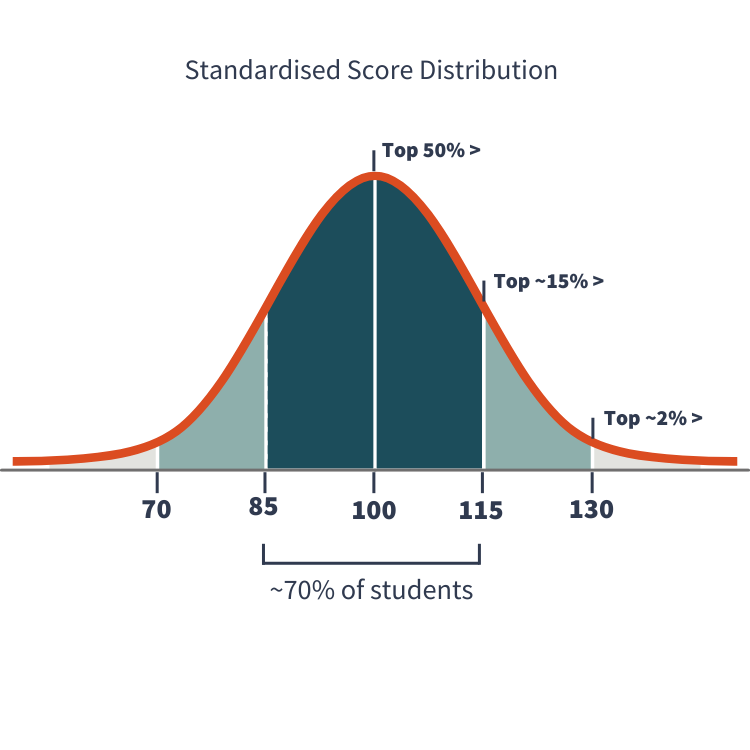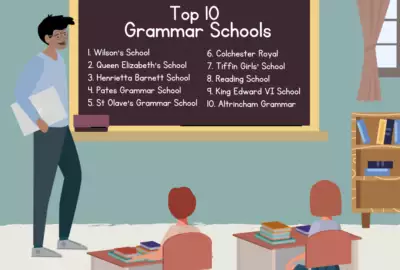Expert Insights
The 11 Plus (11+) Guide: Everything You Need to Know
Published 14th December 2023 by Alastair

If you're navigating the educational path of your child, you've likely heard of the 11 Plus exam. This guide is your gateway to understanding this pivotal exam and its significance in your child's academic journey.
Welcome to our comprehensive 11+ guide where we break down everything you need to know about the 11 plus exam. From understanding the 11+ test structure to accessing our 11 plus exam papers, we’ve got you covered. We're here to provide you with a clear understanding of what to expect. So, let's embark on this journey together, ensuring you're well-prepared to guide your child toward success in the 11 Plus exam and beyond!
The 11 Plus exam is the academic test your child encounters around age 11, marking the grand finale of primary school. It’s a mix of multiple-choice and written brain teasers, spanning English, mathematics, and the ever-tricky verbal and non-verbal reasoning.
But here's the catch: there’s no one-size-fits-all for the 11 Plus. Depending on where you are in the UK, the test can look quite different. ISEB, CEM, GL Assessment – these boards craft their versions of the exam, each with its unique flavour. Independent schools generally write and mark their exams for Maths and English. We will explain the differences between them later in this guide.
1.1The 11 Plus exam was introduced to help find students with strong academic abilities for selective schools. The main idea was to make sure that no matter where you come from, you can get a good education. Even though the test has changed a bit over the years, its main function of deciding who can access selective schools hasn't.
The 11 Plus exam is usually taken by students in their last year of primary school when a child is 10 or 11. The rules about who can take the test can differ depending on where you live and the school you're interested in. For grammar schools, though, most students can sit for the exam, regardless of where they come from or what school they attend. Just be sure to look up the specific requirements that the schools you want to apply for have in place.
Independent schools mostly require that students take the ISEB
Pre-Test. Some will then offer a place, others will require an
additional interview, and the most selective will have an interview and
additional written exams.
If you would like support with ISEB Tuition, contact our Education Team today!
Generally, applications for the 11 Plus exam are submitted in Year 5, often during the spring or early summer. The exam itself usually takes place in the autumn of Year 6 (when your child is turning 11).
The most important thing to remember is to pay attention to the deadlines and carefully follow the application instructions given by your local education authority or target independent school. That way, you can make sure your child can take the exam on the scheduled date.
Independent schools have more freedom in designing their entrance exams. The ISEB is the exam board for independent schools, but they sometimes use school specific written papers for Maths and English, and they might include Creative Writing as a significant part of their test.
Grammar schools
usually use multiple-choice papers, and these exams are regulated by
organisations like the GL or CEM. They mainly cover English, Maths, and
Verbal and Non-Verbal Reasoning. Be careful as some grammar schools have
a writing task in their 11 Plus exam. You should be able to find online
whether the grammar school you apply for includes a writing task inside
their exam papers or not.
So, while the content is alike, the way you'll be questioned can vary quite a bit between these types of schools.
The GL Exam
The GL exam is a written multiple-choice test that covers four subjects: English, mathematics, verbal reasoning, and non-verbal reasoning. The English and mathematics sections test students' knowledge of the primary school curriculum, while the verbal and non-verbal reasoning sections assess their problem-solving and analytical skills. Most grammar schools in the UK use the GL exam, and its results are provided to parents and schools within two weeks of the exam.
The CEM Assessment
The CEM assessment, on the other hand, is an online-only adaptive test that adjusts the difficulty of questions based on a student's performance. The exam also covers English, mathematics, verbal reasoning, and non-verbal reasoning, but the questions are designed to be more challenging and to assess students' ability to apply their knowledge to new situations. Since CEM moved to an online-only exam format in 2022, fewer grammar schools use the CEM exam, but CEM's results are highly regarded for their accuracy and reliability.
To summarise, here are the two main differences:
Both exams are widely used and respected by grammar schools, and parents should research which exam is used by the schools they are interested in and prepare their child accordingly.
We've already written a more comprehensive guide on the differences between the GL and CEM assessment types, and you can read that here.
GL Assessment remains the most significant provider of the exam.
GL Assessment has developed and administered 11+ exams in most grammar schools in the UK. Questions are normally in multiple-choice format, though some authorities use a written answer format for verbal and maths tests. Questions are drawn from a large question bank, but there are a set number of question types and styles.
If you would like a more comprehensive guide to the GL exam, check out our guide: How to prepare for the 11+ GL Assessment
As mentioned above, until 2022, CEM (Cambridge Centre for Evaluation and Monitoring) was a secondary provider of the 11+ exam format but discontinued as a main provider in 2022.
Currently, CEM provides a range of digital assessments designed to be more flexible and responsive to students' abilities. Unlike the static, one-size-fits-all approach of the past, these adaptive tests adjust in difficulty based on the student's responses during the exam, offering a more personalised and accurate measure of their skills.
The CEM exams now cover a variety of subjects, including verbal reasoning, non-verbal reasoning, and mathematics, similar to the traditional 11+ exams. However, the online format allows for a more interactive experience, where questions can dynamically change based on performance, ensuring that each student's abilities are thoroughly evaluated.
We've written a much more comprehensive guide on the CEM 11+ exam, which you can read here.
Understand the Exam Format:
Start by getting to know the specific format of the 11 Plus exam in your area. Different exam boards and schools may have variations in the content and structure of the test. Having a good grasp of the format will guide your preparation efforts.
Start Early:
It's a smart move to begin preparing at least a year in advance. The earlier you start, the more time your child will have to develop their skills and build confidence. This way, 11+ preparation will be less intense and better for your child’s wellbeing, and this will have long-term academic benefits.
Assess Your Child's Strengths and Weaknesses:
Take the time to identify where your child excels and where they may struggle. This will help you to put together a plan to target their needs.
Practice Regularly:
Regular practice is key to success. Use official past papers or materials from reliable sources to mimic exam conditions. Focus on improving time management and accuracy.
Balanced Study Routine:
Create a study routine that covers all relevant subjects, including Maths, English, Verbal Reasoning, and Non-Verbal Reasoning. Make time for each subject based on your child's strengths and weaknesses.
Set Realistic Goals:
Help your child set goals that they can realistically achieve, and make sure they understand these objectives. Celebrate their progress along the way to keep them motivated.
Consider Professional Help:
Think about hiring a qualified tutor or enrolling your child in a preparation course. Professional assistance can offer valuable insights and tailored instruction.

Use Educational Resources:
Take advantage of educational materials such as books, online courses, and websites designed specifically for 11 Plus preparation.
Practice Timed Tests:
Encourage your child to take timed practice tests regularly to improve their speed and confidence. Review their performance to identify areas that need further work.
Use Exam Strategies:
Teach your child exam strategies, like how to deal with multiple-choice questions, manage time during the exam, and stay calm under pressure.
Promote a Positive Attitude:
Promote a positive and growth-oriented outlook. Remind your child that it's perfectly fine to make mistakes and that each attempt is a valuable learning experience.
Maintain a Healthy Lifestyle:
Help your child stick to a healthy routine by making sure they get enough sleep, eat balanced meals, and stay active. A healthy lifestyle helps them think clearly and stay focused.
Practise Past Papers:
Use official past papers from the exam board your child will be taking the test with. This will get them used to the types of questions and topics that might come up in the exam.
Simulate Exam Conditions:
Set up mock exams with time limits to mimic what it's like during the real exam. This helps your child feel more comfortable with the exam environment.
Review Key Topics
In the weeks leading up to the exam, focus on going over important topics and strategies. Try to avoid cramming everything in the night before the exam.
Emotional Support:
Pay attention to how your child is feeling. Keep the lines of communication open, offer reassurance, and be there to support them if they're feeling stressed about the exam.
Get Ready for Exam Day:
Make sure your child gets a good night's sleep, has a healthy meal, and arrives at the exam location with plenty of time to spare. Give them words of encouragement and boost their confidence.
Keep in mind that every student is different, and how they prepare may be different, too. Customise your approach to match your child's specific strengths and areas where they might need extra help. With commitment, a well-organised strategy, and support from family and teachers, your child can do well on the 11 Plus exam.
Effective 11+ preparation starts early. Alongside our 11 plus past papers, this 11+ timeline will guide you in creating a stress-free study schedule.
| Year 4 | How to prepare for 11+ Exams in Year 4 |
|---|---|
| September Y4 | Start thinking about preparation for the 11+ exams. Ensure a solid foundation in key subjects like English and Maths. Introduce a light reading routine to improve comprehension. |
| October Y4 | Assess your understanding of the curriculum. Consider additional support or tuition if needed. Introduce educational activities during the half-term break. |
| November Y4 | Begin familiarising yourself with the 11+ exam format and question types. Introduce simple 11+ style questions in a relaxed environment. |
| December Y4 | Try some reading and creative writing over the holidays. Engage in fun educational games to keep learning enjoyable. Reflect on the past term’s progress and set goals for the next term. |
| February Y4 | Reassess progress in core subjects. Start gently introducing timed exercises and consider light tuition or extra practice sessions if necessary. |
| March Y4 | Begin structured 11+ preparation. Start incorporating regular study periods focused on verbal and non-verbal reasoning. Establish a study routine. |
| May Y4 | Use the half-term to review and consolidate learning. Introduce practice questions from past 11+ papers. Maintain a balanced approach to preparation. |
| End of August Y4 | Review the year’s progress. Prepare for more intensive preparation in Year 5. Consider a gentle refresher to ease back into study habits. |
| Year 5 | How to prepare for 11+ Exams in Year 5 |
|---|---|
| September Y5 | Start intensive 11+ preparation. Implement a structured study plan with specific goals. Increase practice exams and focus on time management. |
| October Y5 | Use the half-term for focused study sessions. Consider a mini-mock exam to assess performance and adjust the study plan based on feedback. |
| November Y5 | Continue consistent practice with 11+ exam papers. Introduce full-length timed practice tests to simulate exam conditions. Refine exam strategies. |
| December Y5 | Maintain light study activities during the holidays. Engage in educational games to keep skills sharp. Review progress to ensure readiness for final preparation. |
| February Y5 | Use the half-term for a final intensive review. Consider additional tuition sessions if needed. Practice with full-length mock exams to build confidence. |
| March Y5 | Prepare for the exam day. Review final exam tips, ensure all materials are ready, and focus on maintaining a balanced routine leading up to the exam. |
| May Y5 | Reflect on the exam experience. If the exams are completed, focus on transitioning to secondary school. If not, continue light review and preparation. |
| End of August Y5 | Finalise preparations for secondary school. Review any remaining concerns about the upcoming school year and prepare for the transition. |
Understanding the 11+ test structure is crucial for effective preparation. The structure of the 11 Plus exam can be different based on where you live, the particular school you're interested in, and the organisation in charge of administering the test. Here's a basic overview of what you can expect in the 11 Plus exam, which typically evaluates a student's abilities in subjects such as Maths, English, verbal reasoning, and non-verbal reasoning.
P.S. Our comprehensive 11+ subject guides (launching soon) will provide you with detailed 11+ exam tips for each section, ensuring your child is fully prepared.
5.1Mathematics:
- The Maths part of the exam tests a student’s skills in working with numbers and solving problems.
- It covers various Maths topics like basic calculations, shapes, equations, and interpreting data.
- Questions can be in different forms, like multiple-choice, short-answer, or written responses.
- Your child must show that they have a good grasp of Maths concepts and can use them to solve problems effectively.
English:
- The English part of the exam checks a student’s reading comprehension, vocabulary, and grammar skills.
- It often involves reading passages and then answering questions to see if the student understood the text.
- Students
might also encounter vocabulary and grammar questions that require finding words with similar or opposite meanings or filling sentences
with the right words.
Verbal Reasoning:
- Verbal reasoning questions test a student’s skills with words, language, and logic.
- Students might have to finish word analogies, spot patterns in letter sequences, or solve word puzzles.
- The aim is to see how well a student can use their verbal reasoning abilities and apply logic to problems related to language.
Non-Verbal Reasoning:
- Non-verbal reasoning tests a student’s skills with visual patterns and shapes.
- Students
will come across tasks like finishing sequences of shapes, finding the
one that doesn't fit, or solving spatial puzzles.
- This part of the exam checks how well a student can spot and understand patterns without relying on language skills.
What your child needs to study for this exam can change depending on where you live and the school they want to attend. But generally, here are some of the Maths topics your child might come across in the test:
Number and Arithmetic:
Geometry:
Algebra:
Data Handling:
Word Problems:
Measurement:
Fractions, Decimals, and Percentages:
Time and Money:
Patterns and Sequences:
Logical Reasoning:
Thinking logically and solving tricky Maths puzzles and problems.
Advanced Topics (varies by exam):
In some 11 Plus Maths exams, students might come across more challenging things like algebraic expressions, working with coordinates on graphs, and solving complex Maths problems using careful thinking.
To get ready for these kinds of questions, it's important to study these topics step by step and practise them often. You can use official practice papers and other materials designed for your specific region and exam board to make sure your child is well-prepared for the Maths part of the exam.
The 11 Plus English exam is about testing your child’s language and reading skills. What they need to study for this exam can be a bit different depending on where you live and which school they want to get into. But generally, here are some of the things they might come across in the test:
Comprehension:
Vocabulary:
Grammar and Punctuation:
Spelling:
Composition and Writing:
Literary Devices and Figures of Speech:
Inference and Deduction:
Poetry Analysis:
Analysing poetry, including identifying poetic techniques, themes, and the overall meaning of poems.
Genre Awareness:
Familiarity with different literary genres, including fiction, non-fiction, poetry, and drama.
Critical Thinking and Evaluation:
Text Structure and Features:
Please note that in the 11 Plus English exam, your child might come across a mix of the things listed above and that the exam might focus more on some areas than others. To get ready, it's a good idea to use official practice papers and other materials designed for your specific area and the exam your child is taking. Also, reading a lot, helping your child to practise their writing, and building strong language and reading skills will help them do well in the exam.
Here are key aspects of 11 Plus Verbal Reasoning. Verbal reasoning questions have different types, such as:
Vocabulary: A strong vocabulary is important. A student should know the meanings of words and how they relate to each other.
General Knowledge: Students will be asked about facts and information from different subjects and fields.
Critical Thinking: Verbal reasoning requires students to think carefully, make connections, and use logical reasoning to solve language-based problems. It's about finding patterns and rules in what they're given.
Problem Solving: Students will use their language skills to solve puzzles and answer questions.
Time Management: Being able to work quickly and accurately is important.
Practice: Like other parts of the 11 Plus exam, practice is key. Students should try different types of verbal reasoning questions to get used to them and gain confidence.
Preparation Materials: You can find special practice books and resources from educational publishers that are made just for the 11 Plus verbal reasoning exam. These materials have sample questions and explanations to help your child get better at these skills.
It's important to know that your child can get better at verbal reasoning with practice and help. Some children might be good at it from the start, but others might need more practice to do their best. So, getting support and using these resources to get comfortable with verbal reasoning is a big part of getting ready for the 11 Plus exam.
Non-verbal reasoning is a part of the 11 Plus exam that tests how well a student can solve problems using pictures, shapes, and patterns, instead of words. Here are key points about 11 Plus Non-Verbal Reasoning:
Types of Questions: In non-verbal reasoning, there are different types of questions, like:
Spatial Awareness: This part of the exam checks if a student understands how shapes and patterns relate to each other in terms of space. This includes things like recognising when shapes are turned, flipped, or changed.
Critical Thinking: The student will need to think carefully and critically to solve non-verbal reasoning problems. It's about finding the hidden patterns, rules, and relationships in pictures and shapes.
Problem Solving: Students need to use logic and problem-solving skills to solve visual puzzles. They have to study the information given and figure out the right answers.
Time Management: Managing time well is important because you don't have a lot of it for these questions. Practising with time limits is crucial to get better at it.
Practice: Just like with other parts of the 11 Plus exam, practising regularly is key to doing well in non-verbal reasoning. Students should try different types of questions to get used to them and improve their skills.
Preparation Materials: You can find special practice books and resources from educational publishers made specifically for the 11 Plus non-verbal reasoning exam. These materials have sample questions and explanations to help your child get better at it.
Your child’s skills in non-verbal reasoning can get better if they practise and get some help. Some kids might be naturally good at understanding shapes and patterns, but others might need more practice to do really well. So, it's important to get support and use resources to feel confident with non-verbal reasoning, especially when getting ready for the 11 Plus exam.
11 Plus practice papers are very important if you want your child to get into selective schools. These papers include a mix of real past exams and ones that are made to look just like the actual exam. They will help your child get used to the questions and how hard they can be.
They cover subjects like Maths, English, verbal reasoning, and non-verbal reasoning, and they come with detailed explanations and answers. These papers will give you all the support your child needs to get ready for the 11 Plus exam and increase their chances of getting into top schools.
In this section, we will take a look at Ivy Education's Practice Papers to show you how some of these question types are formatted:

A typical 11+ English exam often includes two distinct sections: A comprehension section, and a writing section. As shown in our sample page here, the comprehension section of the exam will ask you to understand and explain what they read:
Literal Questions require students to find and recall explicit information directly stated in the text. For example, "What is the name of the main character?"
Inferential Questions: These questions assess the student's ability to read between the lines and make logical deductions based on the information provided. For example, "Why do you think the character felt sad after the event?"
The more papers your child does, the more question types they will encounter. By utilising practice papers, your child will learn to familiarise themselves and master all question types:

When preparing for the 11+ exams, students will encounter a variety of reasoning questions that test their logical thinking and problem-solving abilities. These questions are typically divided into two main categories: Verbal Reasoning and Non-Verbal Reasoning.
Verbal Reasoning Questions
Verbal reasoning questions assess a student's ability to understand and process written information. These questions often involve word puzzles, analogies, and sequences that require students to identify patterns and relationships between words. For example:
Non-Verbal Reasoning Questions
Non-verbal reasoning questions test a student's ability to understand and analyse visual information. These questions often involve shapes, patterns, and sequences that require logical deduction. Examples include:
The more papers your child does, the more question types they will encounter. By utilising practice papers, your child will learn to familiarise themselves and master all verbal and non-verbal reasoning question types. Utilise our exam papers to help you with this:

Super Organisation: Imagine you're a superhero getting ready for an epic adventure. Just like heroes keep their gear in order, you should keep your study materials organised. That way, you'll always know where your study materials, notes, and schedules are.
Understand the Challenge: Think of the 11 Plus exam like a cool puzzle or a tricky quest in your favourite video game. Take some time to figure out what the exam is all about, what kind of questions you'll face, and what you need to do to succeed.
Fun Study Plan: Pretend you're planning a fun adventure with a map filled with exciting places to explore. Your study plan is like that map! Create a schedule with missions for each subject, and don't forget to add breaks for snacks, games, and fun!
Set Study Goals: Imagine you're a hero in a video game, and you have to complete different levels. Set goals for each study session, like defeating a boss in your game. Keep track of your progress on your way to becoming a study hero!
Practice Regularly: Becoming an expert at something takes practice, just like a wizard practising spells. Work through old exam questions and practice exercises regularly. It's like levelling up in a game!
Use All Resources: Heroes have tools and gadgets, right? You can use textbooks, websites, and study guides to understand everything you need for the exam. Think of them as your study superpowers!
Seek Help When Needed: Even heroes ask their friends for help sometimes. If you find something tricky, don't be shy – ask your parents, teachers, or tutors. They're like your study sidekicks!
Manage Time Wisely: Pretend you're a time wizard who needs to complete tasks quickly. Practice finishing your practice tests within a time limit. It's like a challenge in a game!
Focus on Weak Areas: Everyone has things they're not so great at. Identify those areas and work hard to make them stronger, just like levelling up your character in a game.
Stay Positive: Imagine you're the main character in an exciting story, and you're on a quest to succeed. Stay positive, believe in yourself, and picture yourself achieving your goals. You're the hero of your own story, and heroes never give up!
Remember, you're on an exciting journey to conquer the 11 Plus exam, and with these 11+ preparation tips, you'll be well-prepared to face any challenges that come your way!
Navigating the competitive world of private school admissions can feel overwhelming for parents. From the challenging 11+ exams and ISEB Pre-Tests to the pressure of school interviews, knowing how best to support your child through each stage is key. That's why we turned to one of our expert consultants, Katie, who has presented a free webinar to help all parents with aspiring students to support their child through the 11+ admissions process.
Drawing from her personal experience guiding her own children through London’s 11+ admissions, alongside her career as a BBC and Channel 4 presenter, Katie offers tailored tips on how parents can encourage their child to build on existing strengths, stay motivated, and present themselves authentically during interviews and assessments in one of our webinars.
In this webinar, Katie shares practical strategies and insider advice to help families confidently approach the admissions process, while considering the long-term value of an independent education.
Register below to receive a free recording!
Getting private tutoring for the 11 Plus exam can be useful if you want your child to do their best. Private tutors work one-on-one with them and make their teaching fit exactly what they need.

They know all about the exam, its format, and how to do well in it, so they can give your child expert advice and help them feel more ready.
Private tutors can also spend extra time on the areas where your child might not be as strong, help them get better at solving problems, and boost their confidence when taking the exam.
At Ivy Education, we offer:
Understanding age-standardised scores for 11 plus is essential for interpreting your child’s results. Our guide on 11+ exam scoring will help you understand what these scores mean for your child’s future.
You can find a short summary below:

You might hear about something called standardised scores in the 11 Plus exam, and it can be a bit confusing. These scores are made to make the test results fair and easy to compare. They do two important things:
Equalise Test Differences: Sometimes,
different test papers have different numbers of questions or time
limits. Standardisation makes sure that everyone's test is looked at
fairly, no matter these differences. It changes the raw scores (the
number of right answers) into standardised scores.
Age-standardised scores for 11 plus: Children born at different times of the year might have some advantages or disadvantages because of their age, like knowing more words. To make things fair, scores are adjusted to a "standard" level for all children, no matter how old they are.
Standardised scores usually have an average of around 100, and they go from about 70 to 140. The highest score sets a "pass" point. While all this might sound complicated, what's more important for parents is to focus on the pass mark for their area and how many right answers their child gets during mock exams. That's what helps see if they're ready for the 11 Plus. Your child can also take an academic aptitude test to assess potential against independent school averages and UK national standards.
We've written a more comprehensive guide on this. Please refer to our guide: 11+ Standardised Scores Explained.
The score you need to pass the 11 Plus exam is not the same everywhere in the UK. Different independent schools and grammar schools have their own rules and criteria for passing. Here are some examples for grammar schools, but remember that these numbers can change from year to year and can be different in different parts of the same region:
London: You usually need at least 80% to pass.
Kent: The pass score is typically around 330 out of 420, but it can change depending on how many students are taking the test that year.
Buckinghamshire: They often set a pass score of around 121 to 124.
Essex: You need a score of at least 303 to pass.
Birmingham: The pass score is around 220 out of 282 for both parts of the test.
Lincolnshire: Lincolnshire sets the pass mark at approximately 220 out of 282 (for both papers) for its selective schools.
These are just a few examples, and pass scores can be different in other places. Parents and students need to look into the specific requirements for the schools they want to get into and keep up with any changes. You can usually find this information on local authority websites or in school admission guides. It helps you understand what's expected for the 11 Plus exam in your area.
For independent schools, it is better to consider the CAT4 score your child is currently getting. For example, a student who is aiming for Westminster or St Paul’s Girls’ School should be scoring more than 135 in their CAT4. This is because these are some of the most competitive schools in the UK.
Passing the 11 Plus exam comes with some important advantages:
In a nutshell, passing the 11 Plus can set your child up for a bright academic future and open doors to lots of educational opportunities.
At Ivy Education, we provide tuition to help your child pass the 11 Plus Exam and access high-quality education in independent and grammar schools.
The 11 Plus exam is a test in the UK that children usually take when they're around 10 or 11 years old. It's an important exam because it's a key way to get into certain independent and grammar schools. It looks at how good a student is in subjects like Maths, English, verbal and nonverbal reasoning.
It's best to take the 11 Plus exam when your child is in their last year of primary school, usually when they’re 10 or 11. This will be in the Autumn term of Year 6. But remember, the timing might change depending on where you live and the rules of the schools your child wants to go to. So, make sure to check out the exact details for your area.
Registering for the 11 Plus is a two-step process. First, you apply directly to the schools you're interested in. Then, after getting your child’s exam results, you might need to fill out something called the Common Application Form (CAF). This helps you pick your preferences for different schools.
The 11 Plus exam usually tests a child in Maths, English, verbal reasoning, and non-verbal reasoning. But keep in mind that the exact content and how the test looks can be different depending on where you live and who's in charge of the exam.
he way the exam is set up can change based on where you live and who's running it.
It covers subjects like Maths, English, verbal reasoning, and non-verbal reasoning.
The pass mark for the 11 Plus can be pretty different depending on where you are, which school you're aiming for, and how many other students are taking the test that year. These pass marks can change from year to year, so it's important to stay updated. You can usually find the most accurate info about pass marks from your local education authority or the schools themselves.
In general, most children can take the 11 Plus exam, regardless of their background or where they go to school. But remember, there might be some rules about age and residency that you need to check with your local schools or education authority. Just make sure your child meets all the criteria and follows the right steps to take the test.
Prepping for the 11 Plus is a journey. It's a good idea to start early, understand how the test works in your area, figure out where your child needs help, and make a study plan. You can use official past papers, study guides, and online courses. Getting a tutor or taking a preparation course can be a big help too. Just remember to practise regularly, set realistic goals, stay positive, and make sure your child stays healthy with good sleep, balanced meals, and exercise.
Yes, there are lots of practice materials available for the 11 Plus exam. You can find official past papers, books, online courses, and websites that offer sample questions and mock exams made especially for 11 Plus prep. If you want more personalised help, tutors can also provide you with materials and guidance.
We help students ace 11+ exams to gain places at the top schools in the country, with help from our 11+ practice papers!
Check out our Exam Paper Shop




